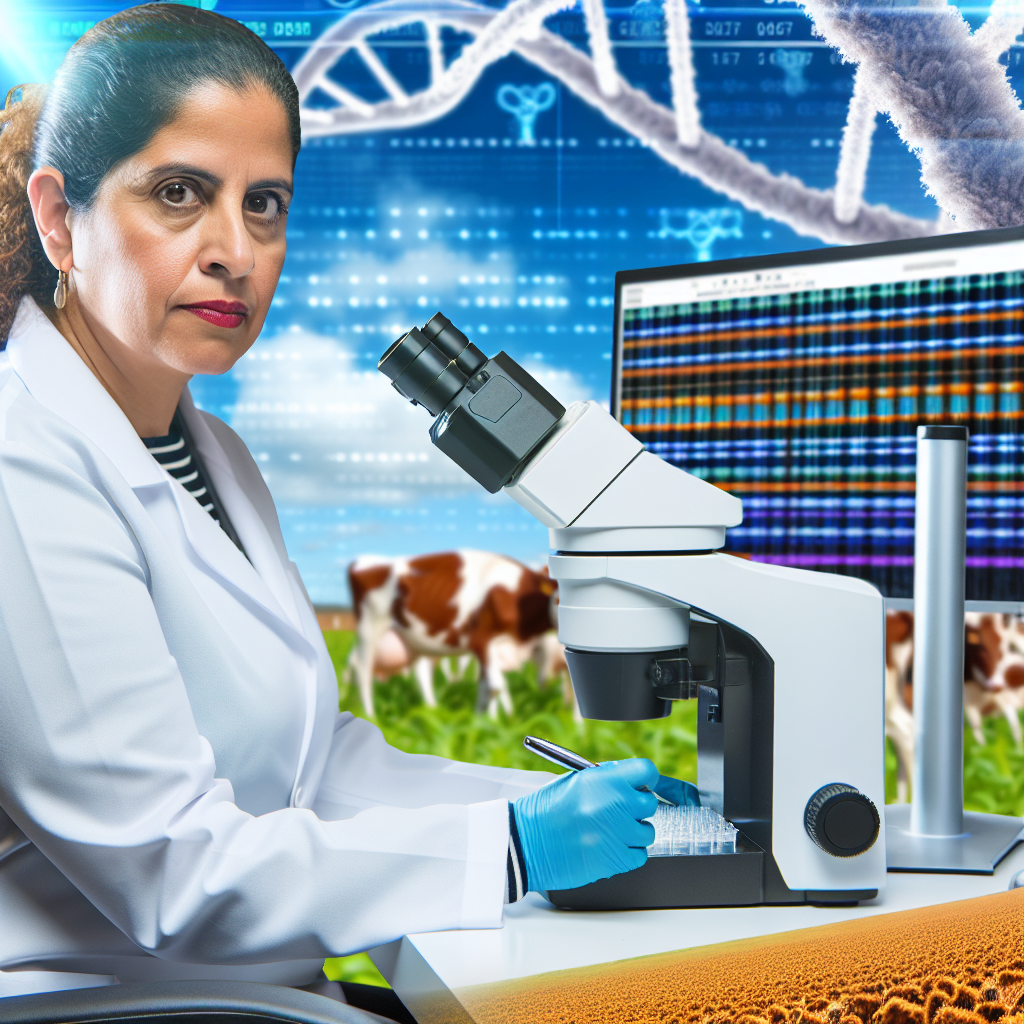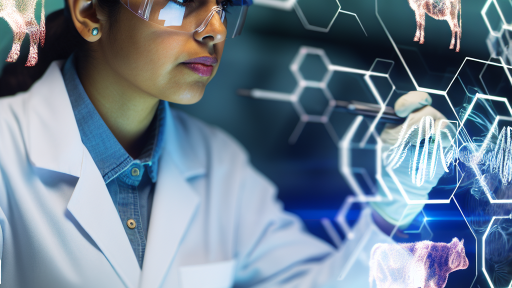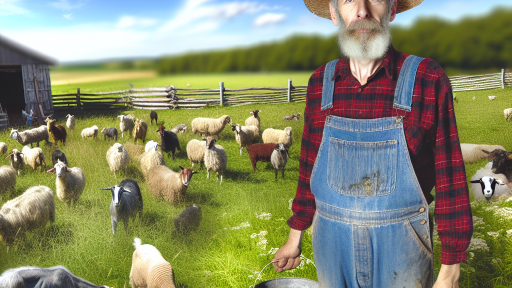Introduction to Genetic Tools in Dairy Farming
Overview of Genetic Tools
Genetic tools revolutionize dairy farming today.
These innovations enhance breeding and production outcomes.
Farmers utilize these tools to improve milk yield.
They also enhance the health and longevity of dairy cows.
Furthermore, genetic tools contribute to sustainability in farming.
Types of Genetic Tools
Several genetic tools operate within dairy farming.
Genomic selection is one of the most popular methods.
This method identifies superior genetics at an early age.
Another tool is marker-assisted selection.
This approach focuses on specific genetic markers.
Additionally, artificial insemination has advanced significantly.
This ensures improved genetic diversity in herds.
Benefits of Genetic Tools
Genetic tools provide numerous advantages to producers.
They increase milk production efficiently and effectively.
Enhanced genetic traits lead to better cow health.
Transform Your Agribusiness
Unlock your farm's potential with expert advice tailored to your needs. Get actionable steps that drive real results.
Get StartedMoreover, they help reduce costs over time.
Farmers can make more informed breeding decisions.
Consequently, this leads to improved herd performance.
Challenges in Implementing Genetic Tools
Despite their benefits, challenges exist in using genetic tools.
The cost of implementing these technologies can be high.
Additionally, farmers may require training to use them effectively.
There is also a need for ongoing research and development.
Finally, some producers may be resistant to change.
Future of Genetic Tools in Dairy Farming
Looking ahead, genetic tools will continue to evolve.
Advancements in technology will enhance their effectiveness.
Moreover, increased focus on sustainability will drive innovations.
Farmers will be able to meet rising consumer demands.
With more research, genetic tools will likely become more accessible.
Benefits of Genetic Enhancement in Dairy Production
Improved Milk Yield
Genetic enhancement significantly boosts milk production levels.
Dairy cows bred with superior genetics produce more milk daily.
Additional milk yields contribute to greater profitability for farmers.
Enhanced Disease Resistance
Genetically improved dairy cattle often exhibit stronger immune systems.
This resilience reduces the incidence of diseases among herds.
Consequently, it lowers veterinary costs and improves herd health.
Better Feed Efficiency
Enhanced genetics aid in more efficient feed conversion.
Cattle utilize feed better, resulting in less waste and increased output.
This efficiency can lead to significant cost savings for dairy operations.
Improved Quality of Milk
Genetic tools can enhance milk quality attributes such as fat and protein content.
Higher quality milk meets consumer demands and market standards.
Showcase Your Farming Business
Publish your professional farming services profile on our blog for a one-time fee of $200 and reach a dedicated audience of farmers and agribusiness owners.
Publish Your ProfileProducers benefit from premium pricing associated with superior products.
Sustainability in Dairy Farming
Genetic enhancement supports sustainability by promoting resilient breeds.
Healthier animals require fewer resources for maintenance.
This approach ultimately leads to a lower environmental footprint.
Adaptability to Climate Change
Genetically enhanced breeds are often more adaptable to varied climates.
This adaptability allows farmers to operate effectively in challenging conditions.
Farmers can maintain productivity even as climate patterns shift.
Overview of Genetic Tools
Traditional Approaches
Traditional genetic tools have long been integral to dairy production.
Breeding programs have utilized selective breeding for decades.
Farmers handpicked superior cows for breeding.
This process aimed to enhance desirable traits over generations.
Traits such as milk yield, fat content, and disease resistance were prioritized.
However, selective breeding can be a slow process.
It may take years to see significant improvements.
Moreover, it often limits genetic diversity in the herd.
Modern Approaches
Modern genetic tools now complement traditional methods.
Advancements in biotechnology allow for more precise interventions.
Genomic selection has emerged as a powerful tool.
This approach estimates the genetic potential of animals early in their lives.
By analyzing DNA markers, breeders make informed decisions.
This significantly accelerates the breeding process.
Furthermore, gene editing techniques are gaining attention.
These tools allow specific traits to be directly modified in the genome.
Comparative Advantages
Modern approaches offer clear benefits over traditional methods.
For instance, they improve accuracy in trait selection.
Additionally, they reduce the time required to achieve breeding goals.
In contrast, traditional methods may rely on less precise criteria.
As a result, farmers often face uncertainty regarding outcomes.
Ultimately, combining both approaches can yield optimal results.
Farmers can utilize the strengths of each method effectively.
Explore Further: Essential Tips for Exotic Livestock Care
Role of Genomic Selection in Breeding Programs
Introduction to Genomic Selection
Genomic selection uses DNA information to enhance breeding processes.
This method allows breeders to make informed decisions based on genetic potential.
As a result, it increases the efficiency of breeding programs.
Benefits of Genomic Selection
Genomic selection provides multiple advantages for dairy production.
Firstly, it accelerates the rate of genetic gain.
Secondly, it improves the accuracy of selecting desirable traits.
Furthermore, it reduces the generation interval.
Ultimately, farmers can produce high-performing animals more quickly.
Implementation in Dairy Breeding
To implement genomic selection effectively, breeders must collect extensive data.
Showcase Your Farming Business
Publish your professional farming services profile on our blog for a one-time fee of $200 and reach a dedicated audience of farmers and agribusiness owners.
Publish Your ProfileGenotype information is crucial to identify superior animals.
Additionally, phenotypic data must be recorded accurately.
This combination helps in predicting the genetic value of candidates.
Real-World Applications
Many dairy farms currently utilize genomic selection in their breeding strategies.
For instance, Maple Grove Dairy has seen significant improvements in milk production.
They leverage genomic tools to select for enhanced health traits.
Similarly, Elmwood Farms has achieved better calving ease and fertility rates.
Future Prospects
The future of genomic selection in dairy breeding looks promising.
Advances in technology will continue to refine selection methods.
Moreover, we can expect more precise trait selection for sustainability.
Consequently, this approach will further enhance dairy production efficiency.
Uncover the Details: Optimizing Livestock Transport for Farm Efficiency
Impact of Genetic Engineering on Milk Quality and Yield
Enhancing Milk Quality
Genetic engineering offers innovative ways to improve milk quality.
It enables the creation of dairy cows with higher nutritional content in milk.
For instance, scientists have developed cows that produce milk with increased omega-3 fatty acids.
This enhancement can contribute to better human health outcomes.
Moreover, genetic tools can help reduce the lactose content in milk.
This modification benefits lactose-intolerant consumers.
Overall, genetic innovations enhance the milk’s flavor and nutritional profile.
Increasing Milk Yield
Genetic engineering significantly boosts overall milk production.
Through selective breeding, farmers can enhance hereditary traits associated with high yield.
Traits for increased feed efficiency also play a crucial role in yield enhancement.
In recent studies, engineered cows demonstrated a notable increase in daily milk output.
These advancements contribute to meeting rising dairy demands sustainably.
Additionally, improved health management through genetics reduces veterinary costs.
Consequently, producers can focus resources on maximizing production.
Long-Term Sustainability
Genetic engineering promotes long-term sustainability in dairy farming.
By improving milk yield, farms can maintain profitability without expanding their operations.
This approach reduces the environmental impact associated with increased milk production.
Furthermore, healthier animals contribute to lower greenhouse gas emissions.
Ultimately, sustainable practices benefit both the industry and consumers.
Investing in genetic tools today sets the foundation for a resilient dairy sector.
Gain More Insights: Selecting the Right Breeds for Your Farm

Case Studies: Successful Implementation of Genetic Tools in Dairy Farms
Enhancing Milk Production: The Thompson Dairy Farm Success
Thompson Dairy Farm in Wisconsin implemented genetic testing in 2021.
This strategy enabled the farm to select high-yielding cow breeds.
As a result, the farm increased milk production by 20% within a year.
The farm monitored gene performance to enhance breeding practices.
Thompson’s effective data analysis improved overall herd health.
Improving Disease Resistance: The Garcia Family Farm
The Garcia Family Farm faced issues with mastitis outbreaks.
In response, they adopted genetic testing for disease resistance.
Showcase Your Farming Business
Publish your professional farming services profile on our blog for a one-time fee of $200 and reach a dedicated audience of farmers and agribusiness owners.
Publish Your ProfileThis approach helped identify cows with natural immunity genes.
Within two years, mastitis incidents reduced by over 30%.
Consequently, the farm reported significant savings on veterinary care.
Optimizing Feed Efficiency: Johnson Livestock Co.
Johnson Livestock Co. focused on feed efficiency to cut costs.
They employed genetic selection for better nutrient absorption traits.
This method improved the feed-to-milk conversion ratio dramatically.
As a result, the company enjoyed reduced feed expenses by 15% annually.
Moreover, the overall production efficiency surged significantly.
Case Study: Pioneer Genetics in Dairy Farming
Pioneer Genetics partnered with local dairy farms to enhance breeding programs.
The program introduced advanced genomic tools and data analytics.
This collaboration yielded superior dairy breeds with enhanced traits.
The initiative resulted in an astounding 25% milk yield increase overall.
Additionally, participating farms reported improved animal health metrics.
Raising Calf Health Standards: The Hartman Ranch
Hartman Ranch implemented genetic screening for calf diseases.
This proactive step ensured healthier calves entered the herd.
Consequently, their calf mortality rate dropped by 40%.
This result benefitted ranch profitability and animal welfare.
Hartman Ranch became a model for integrating genetics in calf management.
Learn More: Optimizing Breeding Cycles for Maximum Efficiency
Ethical Considerations Surrounding Genetic Modification in Livestock
Impact on Animal Welfare
Ethical concerns often arise regarding animal welfare in genetic modification.
Critics argue that altering genes may lead to unforeseen health issues.
Furthermore, they express worries about the long-term effects on specific breeds.
Supporters advocate for improved health and resilience through genetic tools.
Ultimately, balancing these perspectives is crucial in ethical discussions.
Environmental Consequences
Genetic modification can also impact the environment significantly.
For instance, increased productivity might reduce land use over time.
However, potential risks include unforeseen ecological imbalances.
Moreover, reliance on modified organisms may reduce genetic diversity.
Addressing these environmental concerns is necessary for sustainable practices.
Consumer Perspectives and Societal Values
Consumer opinions play a pivotal role in the acceptance of genetic modifications.
Many individuals express concerns regarding food safety and ethics.
Transparency in genetic testing and labeling can aid consumer choices.
Additionally, educational initiatives can enhance public understanding.
Ultimately, aligning practices with societal values is essential for broader acceptance.
Regulatory Framework and Policy Implications
The regulatory environment is critical in guiding genetic modification practices.
Policies must ensure safety, efficacy, and ethical compliance in livestock breeding.
International standards can help harmonize regulations across regions.
Moreover, engaging stakeholders in policy-making can foster trust.
Continuous evaluation of regulations will ensure they adapt to new developments.
Future Trends in Genetic Technologies for Dairy Enhancement
Integration of Genomic Selection
Genomic selection revolutionizes the way dairy farmers select breeding stock.
Showcase Your Farming Business
Publish your professional farming services profile on our blog for a one-time fee of $200 and reach a dedicated audience of farmers and agribusiness owners.
Publish Your ProfileIt enhances precision in choosing animals with desirable traits.
By leveraging genetic information, producers can anticipate performance more accurately.
This technology significantly reduces the time required for traditional breeding methods.
Consequently, farms can achieve improved milk yield and quality faster.
Development of CRISPR Applications
CRISPR technology opens new doors for genetic editing in dairy cattle.
This highly precise method allows for targeted changes in the genome.
Using CRISPR can create disease-resistant breeds, improving herd health.
Moreover, it can enhance traits like milk production and growth rates.
This innovation is poised to reshape the genetics of dairy cattle.
Enhancements in Metagenomics
Metagenomics studies the genetic material from environmental samples.
This approach provides insights into the microbiomes of dairy environments.
Understanding these microbiomes can improve cow health and productivity.
It paves the way for tailored nutritional strategies for individual animals.
As a result, farmers can optimize feed efficiency and reduce waste.
Greater Emphasis on Animal Welfare Genetics
Future trends show a growing focus on animal welfare in genetic selections.
Producers are increasingly prioritizing traits linked to behavioral health.
These include stress tolerance and resistance to certain diseases.
Genetics that promote positive animal welfare can lead to better productivity.
This approach aligns with consumer demands for ethically produced dairy.
Data-Driven Decision Making
The rise of big data in agriculture transforms dairy farming practices.
Dairy producers now utilize advanced analytics for breeding decisions.
Data-driven insights allow for smarter herd management strategies.
Furthermore, technology can optimize mating decisions based on genetic compatibility.
This trend enhances the overall performance and health of the dairy herd.
Additional Resources
Victor E. Cabrera – Animal & Dairy Sciences
Genomic Analysis, Progress and Future Perspectives in Dairy Cattle …




